『安芸国分寺』ホームページへようこそ
Welcome to Aki Kokubunji HP



金嶽山 常光院 安芸国分寺
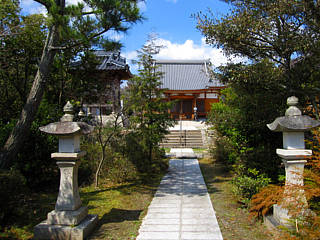
天平の昔、燃ゆるような理想の元に各地で造立され、1200余年のちの今日まで長らえてきた国分寺。
安芸国分寺は東広島市街地に閑静にたたずむ、安らぎに満ちた祈りの道場です。
Aki Kokubunji

A long time ago, there was an emperor burning the ideal.He built a temple in various parts of Japan.In Hiroshima, even after 1200 years, the temple still survives.
Aki Kokubunji is quietly standing in Higashi Hiroshima city area. It is a sacred place of prayer filled with peace.
| 住所 | 広島県東広島市西条町吉行2064 |
|---|---|
| 宗旨 | 真言宗 |
| 本山 | 仁和寺 |
| 御本尊 | 薬師如来 |
| 御真言 | オン コロコロ センダリ マトウギ ソワカ |
| 御詠歌 | 安芸の国 一国一の国分寺 まいる姿は 菩薩なりけり |
| 広島新四国八十八ヶ所(第三十八番)札所 |
| Street address | Hiroshima Prefecture Higashi-Hiroshima City Saijochoyoshiyuki 2064 |
|---|---|
| Sect | Shingon sect |
| General headquarters | Ninna-ji Temple |
| Principal object of worship | Yakushi Nyorai |
| Mantra | 'on korokoro sendari matougi sowaka' |
| The 38th New Henro in hiroshima |
境内
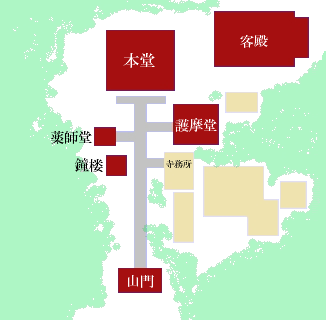
山門をぬけると庭園、すぐに本堂が見えます。
左手に鐘楼、薬師堂、右手は護摩堂です。そして本堂。
四季折々の草花が咲く静寂な境内を見渡し、小鳥たちのさえずりに耳を傾けるだけで心が落ち着き「ホッ」とします。
ご本尊さまに祈りの誠を捧げ、お寺という独特の環境に身を置くことによって心が澄んでゆく感覚を皆様にも味わって頂ければと思っております。
Temple Grounds
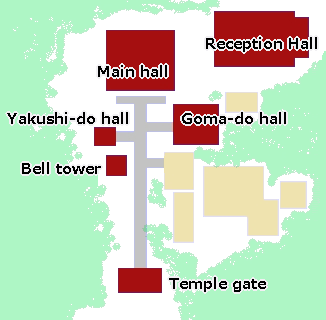
Passing through the gate is a garden.Go ahead and you see the main hall.
On the left you can see the bell tower. On the right side are the temple of the office, and Goma-do.
This place is a sacred place to get a peace of mind.
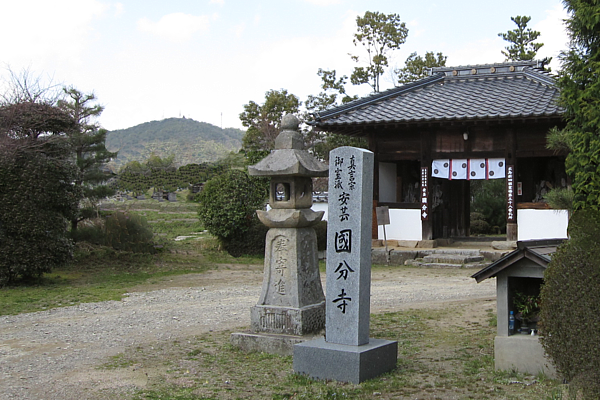
山門
16世紀中期の建立で、現存する八脚門ではこの地域唯一のものです。
「船形の肘木」である垂木は、この時代の特徴といえます。 また仁王像は、肉付きがよく秀作で、この地域では珍しいものです。
-
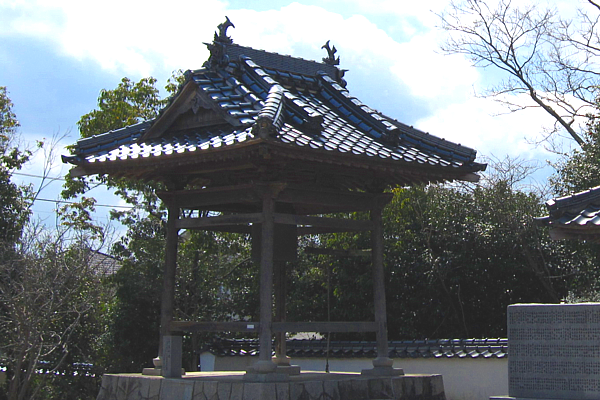
鐘楼
太平洋戦争時に梵鐘は供出。昭和も52年になって梵鐘を鋳造し、鐘楼堂再興しました。
しかし、平成3年9月、台風19号にて倒壊。翌年、檀信徒協力の基に堂を再建しました。
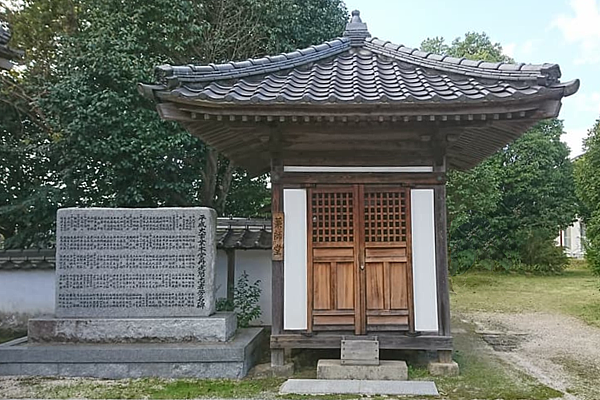
薬師堂
薬師如来(県指定文化財)が安置されています。
全体的に造立当時の藤原様式を伝えています。火災にあったため後世に鼻頭と両手の先が補修されていますが、市内では類例の少ない平安時代後期の仏像として貴重なものです。
もと国分尼寺のご本尊だったという説もあります。 幾度も火災にあい全身が炭化していましたが、平成19年に修復されました。
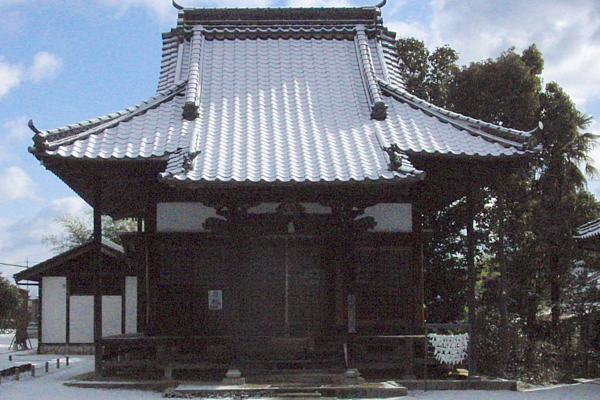
護摩堂
江戸時代後期の建立。
重厚で装飾的な細部意匠を用いた唐様を主体としていますが、天井などに和様の手法がみられ組物の構成も特殊なものです。
取組み内に浅野家の紋が組み込んでありますが、これは当山が藩主浅野氏の勅願所であったために、紋を用いることを許されたからです。
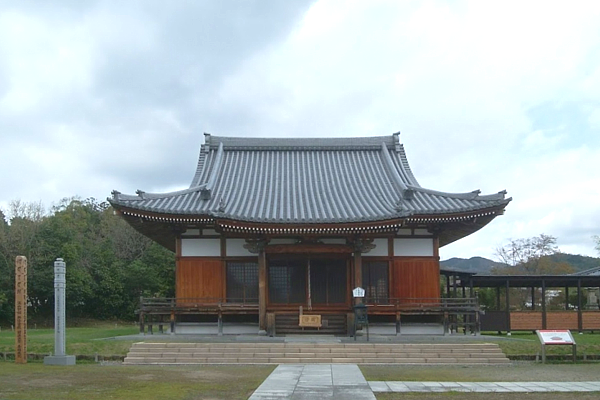
本堂
御本尊は薬師如来(市重要文化財)です。
残念ながら…秘仏のため公開できません…次回のご開帳は平成50年の予定です。
宝暦9年(1759)に火災にあい、首から上だけ助け出されたため、翌年の秋に京都の仏師山口伊織がその御身を補いました。頭部は平安時代初期の面影を宿しているといいます。平安初期から現在まで、その時代々の信奉者を加護してくださる有り難いご本尊です。
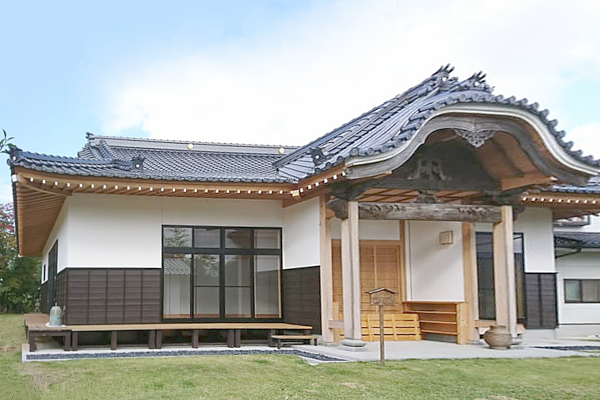
客殿
約140年ぶりに再建されました。
唐破風玄関は、天明元年(1781)、備前国 長船『正通寺』で建築された部材を移築したものです。

Temple gate
It was built in mid-16th century, It is the only eight pillared gate that exists in this region.
Rafters, ship-shaped ancones are characteristic of this period. Nio guardians are bodily build and are considered as a masterpiece. Also, it is rare in this region.
-

Bell tower
The temple bell is delivered during the Pacific war. Recent bell was mold and the bell tower was rebuild in 1977.
However, it was destroyed by Typhoon No.19, on September, 1991. Next year, it was rebuild again in cooperation with supporters.

Yakushi-do hall
Yakushinyorai, Buddha of healing (prefectural designated cultural property) is settled inside.
It is Fujiwara design adopted which is the same as the construction time. Due to the fire, top of a nose and fingertips of both hands were repaired in the past. However, it is the Buddha statue of latter Heian era which is very rare and remain only a few in this city.
It is said that this was originally the principal image of Kokubunni-ji. It suffered a fire many times and the body had been carbonized, but it was repaired in 2007.

Goma-do hall
It was built in latter Edo Period.
The detail design is solid and decorative as Chinese style was applied. However, there is also Japanese style applied on the sealing, parts that composition of square framing, is very unique.
Asano Family crest is inserted within framing since the temple was used as an imperial prayer place of feudal lord Asano.

Main hall
The principal image is Yakushi nyorai (Municipally designated important cultural property)
It is not open to the public since it is a hidden Buddhist statue. Next unveiling event will be in 2028.
It was suffered from a fire in 1759, and only the head was rescued. Next year, Iori Yamaguchi, the sculptor of Buddhist image from Kyoto, repaired the body, so the head was created in early Heian era. This is very special and blessed Buddhist statue protects believers from early Heian period to the present.

Reception Hall
It was rebuilt for the first time in 140 years.
Entrance is the type of cusped gable, which was removed from Shotsu-ji temple in Osafune, Bizen Province in 1781 and was reconstructed here.
























